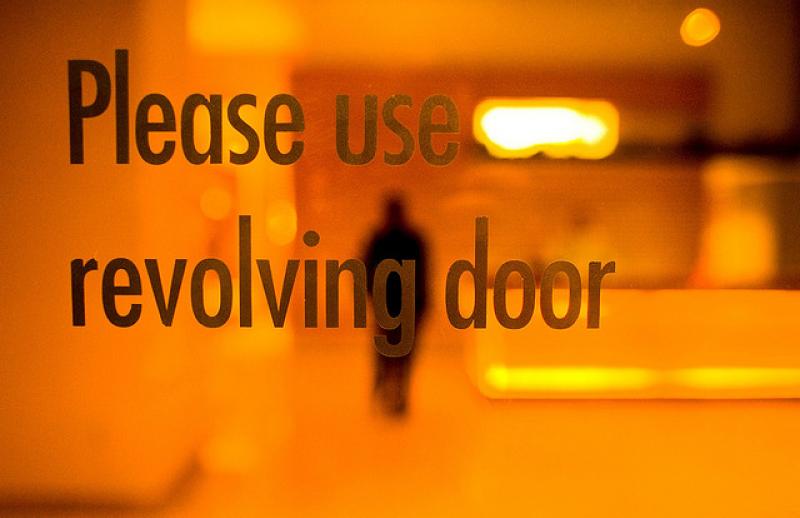
From CCS to unsustainable biomass: the revolving door in EU climate and energy policy
The EU’s woefully inadequate legislation to tackle climate change and ensure sustainable energy use in Europe sits on the backdrop of a revolving door between the Commission’s energy staff and the energy industry lobby. Two new RevolvingDoorWatch cases illustrate how a serious loophole in the revolving door rules is enabling those writing climate and energy policies to move straight into the industries affected by them. Staff on non-permanent or ‘temporary’ contracts (for up to six years!) still face no screening for post-employment conflicts of interest. The result of this loophole is that these public officials face no restraints on trading their Commission experience for a cushy industry job, even when it is on exactly the same dossier they were previously responsible for.
2013 has brought to light the revolving door case of Fanny-Pomme Langue, who was a Policy officer in the Commission’s DG Energy from 2009 to 2012, where she co-managed the drafting of the Commission’s report on the sustainability requirements for solid/gaseous biomass. Four months after leaving the Commission, Langue became Policy Director of the European Biomass Association (AEBIOM), which represents the European bioenergy sector and aims to “ensure favourable business conditions for its members”. Langue’s main task isto represent the bioenergy sector at EU level; she is now an accredited lobbyist at the European Parliament for AEBIOM, and has contacts with policy makers in the Commission. In a stark illustration of the conflict of interest here, Langue has published her “views”, as AEBIOM director, on what the Commission’s expected biomass sustainability criteria are “likely to be based on” - but she herself had co-managed the Commission’s work on these criteria! Read the full case on RevolvingDoorWatch.
Langue’s case is similar to the earlier example of Poppy Kalesi. Kalesi was a Programme Manager at the Commission’s DG Energy from 2008 to 2010. Kalesi worked on the Strategic Energy Technologies (SET) plan and on controversial Carbon Capture and Storage (CCS). The same month she left DG Energy, after more than two years, she took up the job of ‘EU Regulatory Affairs Advisor’ at Norwegian oil and gas company Statoil. Her Statoil job included “communicating natural gas business strategy to regulators, politicians and civil servants”. Kalesi became Statoil’s ‘Senior Consultant in Innovation Strategy’ in 2012, which includes supporting the business needs of their ‘world-leading’ CCS programme. Whilst at the Commission, Kalesi had been Programme Manager on CCS for over a year, including managing the implementation of one billion euros of EU sponsored CCS projects, and developing policy measures to provide further financing to CCS projects. Read the full case on RevolvingDoorWatch.
Despite the very direct crossover with their previous Commission jobs, neither Langue nor Kalesi’s new industry jobs were screened for risk of conflicts of interest, due to a simple technicality: they were not on permanent – life-long – contracts. This loophole has been causing problems for a long time. A rather vivid example CEO has previously documented is the case of Mårten Westrup. Westrup first worked for the European Commission’s DG Enterprise and Industry, as a Legal Officer and then Policy Officer between 2007-2010, working on industrial policy and carbon dioxide emissions from cars. He then moved to BusinessEurope, the biggest business lobby group in Brussels, becoming advisor to its Industrial Affairs Committee, with specific responsibility for climate change. BusinessEurope’s members range from Hyundai and Toyota to BP and ExxonMobil. Commission documents revealed that Westrup used his contacts with former colleagues at DG Enterprise to promote BusinessEurope’s position on climate change, successfully enlisting DG Enterprise’s help to resist a proposal by DG Climate Action on industrial gas offsets in the Emissions Trading Scheme.
Amazingly, Westrup then returned to the Commission in 2011, as a Policy Officer in DG Energy, and has since been working on the Energy 2050 Roadmap. In both cases, Westrup’s trip through the revolving door wasn’t scrutinised for conflicts of interest because he was a employed on a temporary contract. In fact, when he returned to the Commission from BusinessEurope, Westrup himself raised the question of potential conflicts of interest, only to be told by DG Energy that “no such conflicts exist”. Westrup’s case is now part of an ongoing investigation by the European Ombudsman into the Commission’s failure to take the revolving door seriously.
Job moves like Langue, Kalesi and Westrup’s are not subject to any scrutiny because the revolving door rules in the Staff Regulations do not apply to non-permanent contract staff unless they had access to (undefined) ‘sensitive’ information. The Commission is using this kind of non-permanent contract staff more and more, making the scope of this loophole a growing cause for concern. The new Staff Regulations, which were adopted in June 2013, unfortunately do not close this loophole, and in fact allow such ‘temporary’ contracts to employ a staff member for up to six years.
CEO believes that in order to avoid the risk, perception or actuality of conflicts of interest, the loopholes for staff on non-permanent contracts must be closed. Whilst non-permanent staff may not, in some circumstances, require the same stringent revolving door rules as permanent staff, appropriate and proportional rules are absolutely vital, especially as so-called ‘temporary’ staff can be employed for up to six years. If moving to a lobby job in the same policy area, non-permanent staff should also be screened for conflicts of interest, with restrictions imposed where appropriate. CEO considers that non-permanent contract staff who have worked at the Commission for two or more years, should face the same two year cooling-off period on industry lobby jobs that we advocate for public officials in general.
* Background research for the two new RevolvingDoorWatch cases by Manuel Melzer, ALTER-EU trainee, April 2013. Image CC BY-NC 2.0 Thomas Hawk, via Flickr
